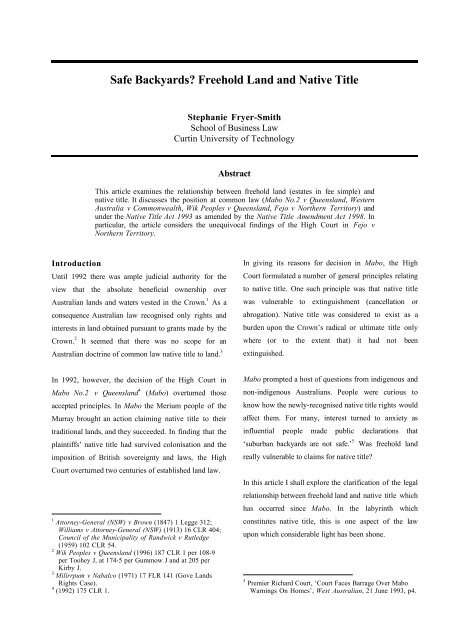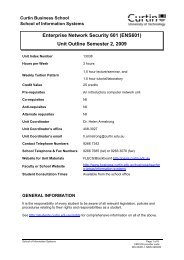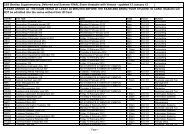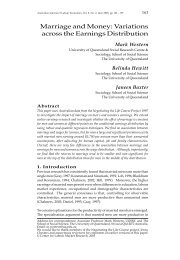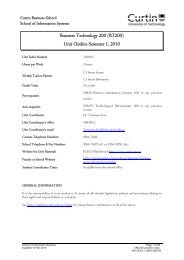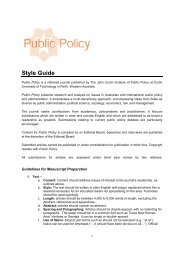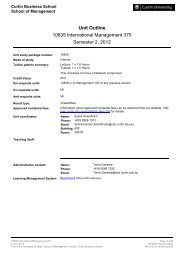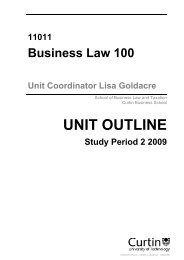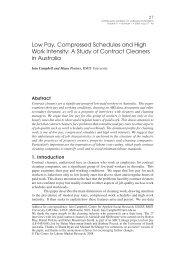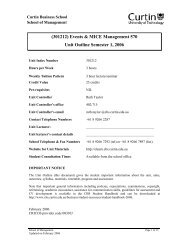Safe Backyards? Freehold Land and Native Title - Curtin Business ...
Safe Backyards? Freehold Land and Native Title - Curtin Business ...
Safe Backyards? Freehold Land and Native Title - Curtin Business ...
- No tags were found...
Create successful ePaper yourself
Turn your PDF publications into a flip-book with our unique Google optimized e-Paper software.
The Real Estate Industry - Volume 2, 2000dissolution in early 1998, the amending legislation (theAmended Act) received Royal Assent on 27 July 1997<strong>and</strong> came into force on 30 September 1998.The Amended Act <strong>and</strong> ‘Confirmation ofExtinguishment’The Amended Act created a number of new native titleregimes, one of which operates to ‘confirm’ the pastextinguishment of previous exclusive possession acts. 42Previous exclusive possession acts are defined to includea valid grant of freehold l<strong>and</strong>, where the grant occurredon or before 23 December 1996. 43These ‘confirmationof extinguishment’ provisions extend to acts occurringbefore the RDA came into effect on 31 October 1975 –to ‘historic’ grants. Other previous exclusive possessionacts include commercial, residential <strong>and</strong> communityleases, ‘scheduled’ interests (interests enumerated inSchedule 1 to the Act 44 ), <strong>and</strong> areas covered bygovernment roads <strong>and</strong> public works. The Amended Actexpressly provides that extinguishment is permanent. 45The ‘confirmation of extinguishment’ provisionscontained in the Amended Act were colourfullydescribed by the then Deputy Prime Minister asproviding ‘bucket-loads of extinguishment’. 46 (It shouldbe noted that some of the interests classified in theAmended Act as previous exclusive possession actsmight not extinguish native title at common law. Forexample, some types of residential or community leasesin fact do not confer exclusive possession.)The Amended Act provides for the payment ofcompensation for extinguished native title by the42 Part 2, Division 2 B of the Act.43 Section 23B(2)(b). 23 December 1996 is the date uponwhich the Wik decision was h<strong>and</strong>ed down.44 Western Australian scheduled interests are contained inPart 4 of Schedule 1 <strong>and</strong> include many interests createdpursuant to the Western Australian <strong>L<strong>and</strong></strong>s Acts of 1898<strong>and</strong> 1933.45 Section 237A.46 Highfield J ‘Interview by Tim Fischer with JohnHighfield’, ABC TV World at Noon, transcript , 4September 1997.relevant government. 47 A ‘freehold cap’ 48 to the quantumof compensation was introduced : however, this remainssubject to the overriding constitutional requirement of‘just terms’ compensation. 49However, compensation isnot payable where native title would have beenextinguished under the common law. The Amended Acttherefore unequivocally renders ordinary ‘backyards’ <strong>and</strong>exclusive possession tenures immune from native titleclaim.It has been suggested that these provisions breach theanti-discrimination provisions of the RDA. 50 The UnitedNation Committee on the Elimination of All Forms ofRacial Discrimination has reported that the ‘confirmationof extinguishment’ provisions (together with otheraspects of the Amended Act) ‘discriminate against theindigenous title-holders’. 51The Federal Government isobliged by international law to act in a mannerconsistent with its obligations under its internationaltreaties. 52Although the Amended Act renders the status of freeholdgrants <strong>and</strong> exclusive possession tenures vis a vis nativetitle beyond doubt, legislation is always subject tosubsequent amendment or repeal. Accordingly, itremained important to finally determine the relationshipbetween grants of freehold <strong>and</strong> native title at commonlaw.The Common Law PositionEarly Authorities47 Section 23J. Note that the States <strong>and</strong> Territories passedlegislation complementary to the amended Act in 1998:in Western Australia the legislation is the <strong>Title</strong>sValidation Amendment Act 1995 (WA).48 Section 51A provides that the maximum amount payablefor an act which completely extinguishes native title isthe amount which would have been payable if that act hadbeen a compulsory acquisition of the freehold.49 Section 51(1).50 See for example Kamian T Implications of the ProposedAmendments to the <strong>Native</strong> <strong>Title</strong> Act, Issues Paper 19,<strong>Native</strong> <strong>Title</strong> Research Unit, AIATSIS, Canberra.51 CERD Committee, Decision 2(54) on Australia, 18 March1999, UN Ref: CERD/C/54Misc.40/Rev.2.52 Minister for Immigration v Teoh (1995) 183 CLR 373.39
Legal Issues in <strong>Business</strong>In Mabo, the <strong>Native</strong> <strong>Title</strong> Case, <strong>and</strong> Wik, the HighCourt had observed, obiter, that a grant of freehold titleextinguishes native title. The Wik finding that nativetitle was capable of co-existence with other tenuresheightened interest in this question. However, it was notto come squarely before the High Court until 1998, inFejo v Northern Territory 53 (Fejo).Fejo v Northern TerritoryIn 1996 the applicant Fejo, in conjunction with others asrepresentatives of the Larrakia people of the NorthernTerritory, lodged an application for a native titledetermination. Part of the l<strong>and</strong> which the applicantsclaimed had been granted in freehold to one JohnBenham in 1882. Subsequently, in 1927 the Crowncompulsorily acquired the l<strong>and</strong> for the purposes ofestablishing a quarantine station, <strong>and</strong> in 1956 aleprosarium had been constructed upon it. Later the l<strong>and</strong>fell into disuse becoming, effectively, vacant Crownl<strong>and</strong>. In 1996 the l<strong>and</strong> was subdivided <strong>and</strong> certainCrown leases in respect of it were granted.In 1997 the applicants sought declarations in the FederalCourt that native title existed in relation to the l<strong>and</strong>which was subject to the Crown leases. The matter washeard at first instance by Justice O’Loughlin whodismissed the claim. The applicants lodged an appeal tothe Full Court of the Federal Court; however, the matterwas removed to the High Court for determination by aFull Bench of the High Court. 54The appeal was heard by the Full Bench on 22 <strong>and</strong> 23June 1998, while the controversy about the enacting ofthe Amended Act was still high. At the hearing theappellants argued that the grant of freehold in 1882 hadsuspended, rather than extinguished, native title. Theyclaimed that the native title had revived upon reversionto the Crown in 1927. The appellants also contendedthat native title may continue to exist within a freehold53 (1998) 72 ALJR 1442.54 Pursuant to s 18 of the Judiciary Act 1903 (Cth).estate, in much the same way as do easements <strong>and</strong>profits a prendre.The Full Bench h<strong>and</strong>ed down its decision on 10September 1998, three weeks before the Amended Actcame into force. In a joint judgment, six justices 55rejected the plaintiffs’ claims. They declared that‘[n]ative title is extinguished by a grant in fee simple’because:…the rights that are given by a grant infee simple are rights inconsistent with thenative title holders continuing to hold anyof the rights or interests which togethermake up native title. 56The justices affirmed that freehold was ‘‘for almost allpractical purposes, the equivalent of full ownership ofthe l<strong>and</strong>’’ 57 <strong>and</strong>, as such, it ‘simply does not permit ofthe enjoyment by anyone else of any right or interest inrespect of the l<strong>and</strong> unless conferred by statute.’ 58Anyanalogy between native title <strong>and</strong> interests such aseasements <strong>and</strong> profits a prendre was rejected, thejustices declaring that ‘very different considerationsarise’ when dealing with the intersection of conventionalproperty rights <strong>and</strong> ones which ‘owe their origin to adifferent body of law <strong>and</strong> traditions.’ 59In addition, the justices emphasised that extinguishmentwas permanent <strong>and</strong> irreversible. They declared that agrant of fee simple ‘does not only have some temporaryeffect on native title rights.’ 60 <strong>Native</strong> title could not berevived upon the l<strong>and</strong> reverting to the Crown: ‘There canbe no question…of those rights springing forth again.’ 6155 Gleeson CJ, Gaudron, McHugh, Gummow, Kirby, Hayne<strong>and</strong> Callinan JJ.56 Fejo, at 1451.57 Ibid.58 Ibid, at 1452.59 Ibid, at 1454.60 Ibid, at 1452.61 Ibid, at 1454-1455.40
The Real Estate Industry - Volume 2, 2000Although the question of compensation was notaddressed in any detail, references in the justices’judgment to passages in Mabo <strong>and</strong> Wik indicatedsupport for Justice Brennan's view that at common lawnative title may be extinguished by an act of the Crown,without liability for compensation to the native titleholders. 62In a separate judgment Justice Kirby agreed with thefindings of the other six justices. He declared that nativetitle is ‘inherently fragile’ 63 : it is ‘[s]o fragile…<strong>and</strong> sosusceptible…to extinguishment that the grant [offreehold title], without more, ‘blows away’ the nativetitle forever.’’ 64However, Justice Kirby also expressedsympathy for the appellants’ situation, observing thatupon the l<strong>and</strong>’s reversion to the Crown it had reverted‘to a kind of wastel<strong>and</strong> status in which the incidents ofnative title could undoubtedly be enjoyed in fact.’ 65A significant feature of the decision in Fejo was therefusal of any of the justices to be persuaded by overseasauthorities. The jurisprudence of the United States,Canada, <strong>and</strong> New Zeal<strong>and</strong> had greatly influenced thejudgments of the (differently-constituted) High Court inMabo. However, in Fejo, the justices doubted that‘much direct assistance’ could be had from othercommon law jurisdictions. 66Justice Kirby cautionedthat ‘care must be exercised in the use of [overseas]judicial authorities…because of the peculiarities whichexist in each of them arising out of historical <strong>and</strong>constitutional developments, the organisation of theindigenous peoples concerned <strong>and</strong> applicablegeographical or social considerations.’ 67was underscored by the High Court's rejection of thepossibility of freehold l<strong>and</strong> <strong>and</strong> native title co-existing,<strong>and</strong> its declining to take into account North American<strong>and</strong> New Zeal<strong>and</strong> native title jurisprudence.ConclusionIn the 1990s developments in the complex law of nativetitle, both common law <strong>and</strong> statutory, posed significantchallenges for the judiciary, the legal profession, nativetitle holders <strong>and</strong> claimants, <strong>and</strong> non-indigenousAustralians.In relation to at least one aspect of native title it can beseen that the common law <strong>and</strong> legislation converge. Theposition in relation to freehold is clear: the grant of a feesimple estate excludes the continued existence of nativetitle rights <strong>and</strong> interests. Regardless of what ‘in fact’occurs on that freehold l<strong>and</strong> - whatever native title rights<strong>and</strong> customs may actually be practised - in legal terms,native title is permanently extinguished.The sweeping changes made to the native titlelegislation in 1998 indicate a significant shift inpolitical <strong>and</strong> public attitudes to native title since theground-breaking decision in Mabo. The orthodoxyevident in the High Court's decision in Fejo also appearsto signal a return to conservatism in the judiciary.The focus of the High Court’s decision in Fejo was onthe nature of <strong>and</strong> the rights attaching to freehold l<strong>and</strong>,rather than the protection of native title. This approach62 Ibid, at 1459.63 Ibid, at 1466.64 Ibid, at 1468.65 Ibid.66 Ibid, at 1454.67 Ibid, at 1465.It is now beyond question now that our suburbanbackyards – <strong>and</strong> our freehold farming <strong>and</strong> commerciall<strong>and</strong>s - are ‘safe’. For those whose tenures confer lessthan exclusive possession, however, the fullimplications of native title are still to be known.41


